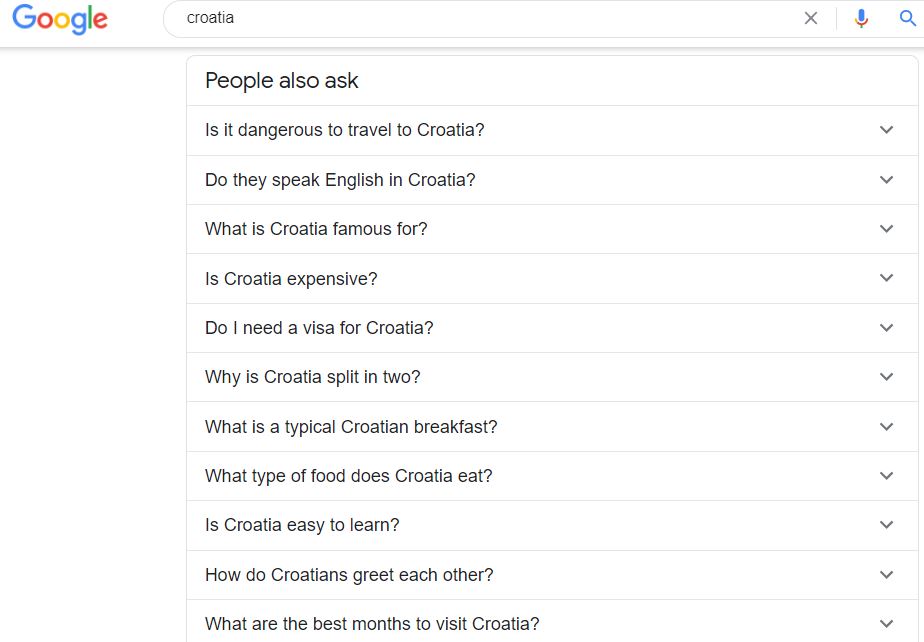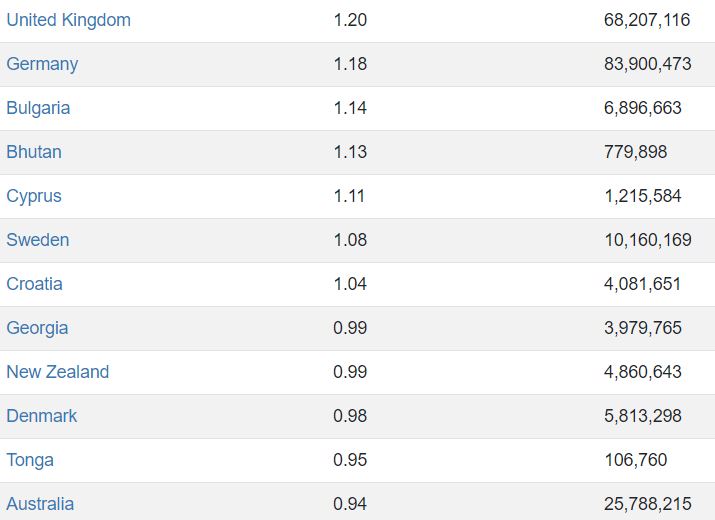Tramlines Blocked Over 60 Year Unresolved City of Zagreb Land Dispute
February 14, 2021 – A resident of suburbs to the north of the Croatian capital today blocked the city's tramlines with a fence in protest over an unresolved City of Zagreb land dispute. He threatened to repeat the action over forthcoming days
Marijan Kos and his neighbours are seemingly sick of waiting. The City of Zagreb land dispute they and their families have been involved in has been dragging on for sixty years. Many have watched their neighbours die awaiting a resolution.
They are residents of the north Zagreb suburb of Gračani, just before Mount Medvednica and almost the northernmost point to where city trams travel. And they claim ownership of land over which the trams now pass. Nobody disputes their claim. But, following the compulsory confiscation of their property for passage of the tramway network, they have still not been reimbursed. So, this morning, Marijan Kos took matters into his own hands.
Carrying a prepared fence, another man and Mr Kos - who is president of the neighbourhood's local committee - stood on either side of the tram line to block an approaching tram. They waited for only 30 seconds before backing down, then allowed the driver and his passengers to continue on their way. The Zagreb land dispute protest was symbolic. This time.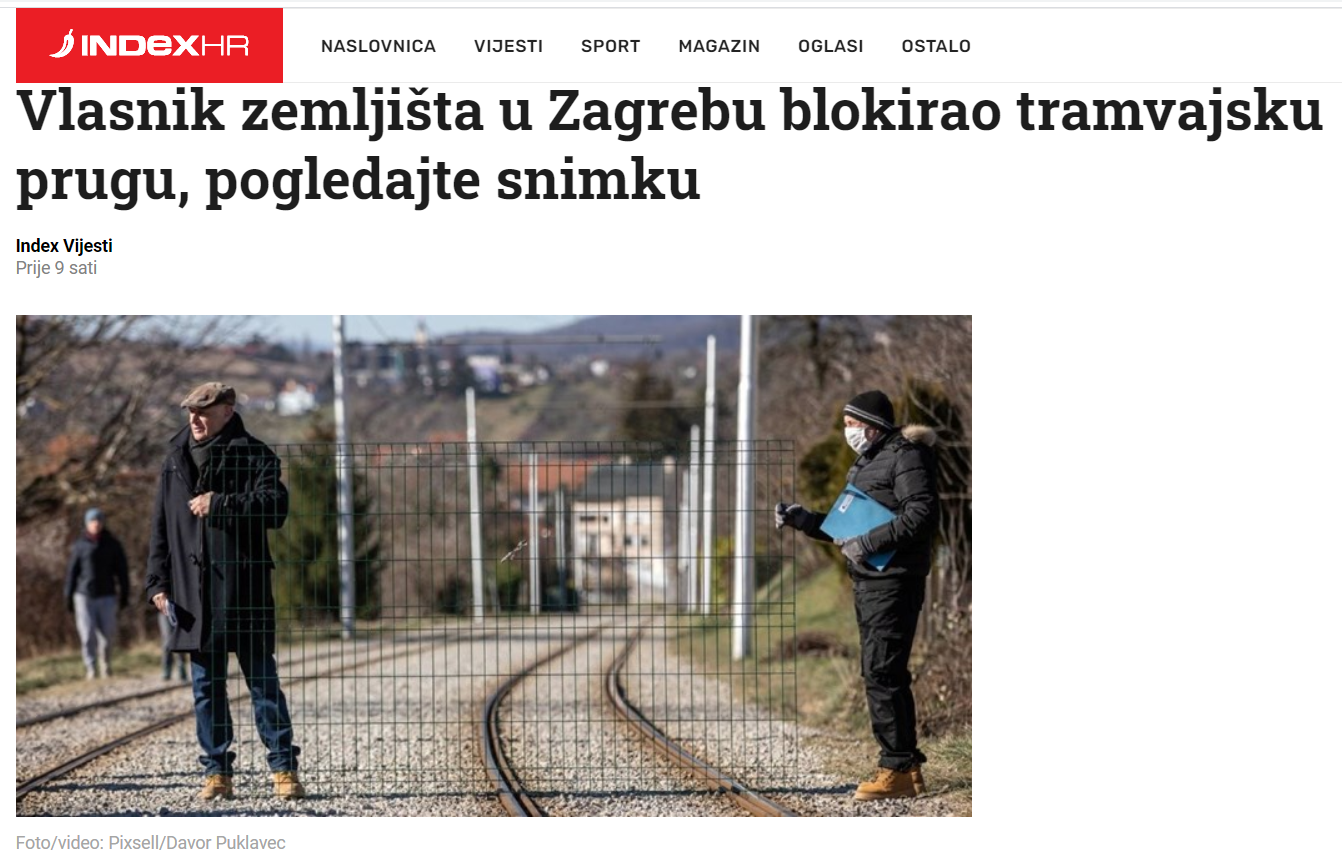 How Croatian portal Index carried the story of today's Zagreb land protest on the tramlines © Index screenshot
How Croatian portal Index carried the story of today's Zagreb land protest on the tramlines © Index screenshot
"With today's action we want to warn the City of Zagreb of the property-legal problem that has not been resolved since 1959,” Mr. Kos told reporters who had gathered to witness the Zagreb land dispute protest. “Since that year, we've had a final decision by which ZET (the tram network operator) is obliged to compensate the inhabitants of Gračani for the land confiscated for the construction of the tram line from Mihaljevac to Gracanski Dolj. That's about 166 land registry entries (and) there are about the same number of owners - some have already died and had no heirs. We are talking about 68,926 square meters of land on both sides of the tram line.”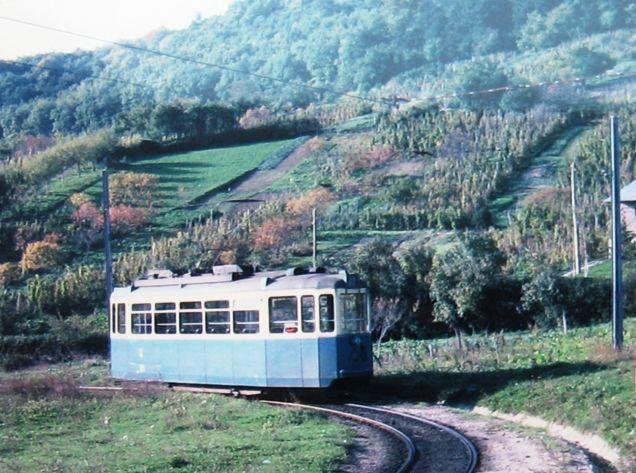 The tramline has run through the disputed land in Gracani for well over 50 years © Zagreb Facts
The tramline has run through the disputed land in Gracani for well over 50 years © Zagreb Facts
Mr. Kos invited the City to talk and uphold the standing agreement because, he says, it is in everyone's interest to resolve the matter in the best possible way. According to Vecernji List, who had a reporter at the scene, Mr. Kos reminded everyone that this tramline - once the mountain cable car opens - will become one of the main means of transport for all Zagreb residents and tourists to reach the top of Mount Medvednica.
Signalling that the Zagreb land dispute may escalate over forthcoming days, Mr. Kos went on to say; “We have prepared a fence and in the next few days we plan to install it and close the passage of trams if the City of Zagreb does not invite us to a meeting to try to solve this problem that has been dragging on for 50 years.”
SAP and b4b Offer Localised Solution for SMEs in Croatia
ZAGREB, 14 February, 2021 - Companies SAP d.o.o. and b4b announced at an online conference last Wednesday that SAP's localised Business ByDesing solution in the cloud also targeted small and medium-sized enterprises, after offering solutions for large enterprises and business systems on the Croatian market.
This solution isn't new in SAP's portfolio, because it is already being used in more than a hundred countries, but now it has been localised and adapted to the Croatian market for small and medium-sized enterprises, said the CEO of SAP in Croatia, Anita Lacmanović.
She explained that the solution can help to reduce costs and improve business, adding that SAP sees great potential on the market of small and medium-sized enterprises in Croatia and the region and that they also support cloud solutions in Croatia, believing that they bring many benefits to companies.
Sanjin Katinić of the b4b company said that the localised solution was, in addition to being translated into Croatia, adapted to other important elements of the business environment in Croatia, including the financial segment and the legal framework.
The director of the company MPG d.o.o., Joe Bašić, was also at the conference, and he said that after the extremely difficult 2020, as a medium-sized enterprise they needed a solution for insight into business and all processes in order to make better decisions for the company but also its 500 employees and many partners and clients on the international market.
Untapped Export Potential of Croatian Machine Manufacturing Estimated at $400m
ZAGREB, 14 February, 2021 - The total untapped export potential of machine and equipment manufacturing in Croatia is US$399.8 million, according to a study by the Croatian Chamber of Commerce (HGK) carried out as part of the Fit4Globe project.
The study has found that the product groups with the largest export potential are parts for gas turbines and turbojet engines, parts for lifting and moving machines and equipment and construction machinery, parts for air pumps, compressors and fans, combine harvesters, temperature control valves and parts for internal combustion devices.
The study dealt in detail with 12 products, 10 of which were selected based on their unused export potential, while two were chosen for their importance for the domestic mechanical manufacturing industry. These products have an untapped export potential in 34 countries, in the total amount of $127.8 million. The realisation of their full potential would increase exports by more than a third, or 37.2%.
A total of 634 companies operate in the Croatian machine and equipment manufacturing sector and as many as 94% of them are small and medium-sized enterprises. They employ a total of 11,400 workers and generate HRK 7.7 billion in revenues (4.4% of the gross value added of the manufacturing industry) and HRK 337 million in profits. With a total of $1.22 billion in exports, they make up 6.6% of the country's total foreign trade.
Currently, the leading export markets for Croatian machinery are Germany with a share of 21.5%, Slovenia with a share of 12.5% and Austria with a share of 8.5%.
HGK president Luka Burilović underscored that by exploiting the full potential, total exports of machines and mechanical equipment would increase by almost a third (32.6%) from the present $1.22 billion, which is 6.6% of total exports. "The markets with the greatest likelihood of export growth are Germany, Italy, the United States and Hungary," he said.
Željko Mažuran, the head of the Metal Processing Industry Association at the HGK, said that the biggest challenge for the industry was the need for greater and faster investment in plant modernisation.
As the biggest problem Mažuran cited the uncompetitiveness of the Croatian economy, as a result of which there are not many greenfield and brownfield investments. He said that the main causes of uncompetitiveness were an unfavourable monetary policy, an unrealistic exchange rate of the kuna against world currencies and a low level of technological processes, and that therefore EU funds should be directed at upgrading production and industrial plants. He also mentioned a shortage of skilled metal workers and called for adjusting school curricula.
Corporate financial statements for last year show that the five largest Croatian exporters of machinery and mechanical equipment generated approximately 40% of the industry's total revenues on foreign markets, while the ten largest companies generated nearly 50%.
The world market in the manufacture of machinery and mechanical devices is dominated by the United States which, along with China and Germany, was the leading global exporter in 2019. These three countries are also the largest importers of machinery and equipment. Along with Germany, Italy is the largest manufacturer in the In the European Union.
Rijeka Restaurateur Bars Entry of HDZ members, Mayor Calls for Defusing Tensions
ZAGREB, 14 February, 2021 - After the owner of the "Three Monkeys" cafe in Rijeka stated on his Facebook page that he barred the HDZ party's members and sympathisers from entering his property, the city's mayor on Sunday said that he could understand the restaurateur's revolt, but was against dividing residents along party lines.
The cafe owner Tomislav Kovačević wrote in the last two days on his Facebook account that members and voters of the Croatian Democratic Union (HDZ) are personae non gratae in his cafe, citing his feeling of humiliation by the HDZ party.
Kovačević's statement ensued after the COVID-19 crisis management teams said that as of Monday, cafes and bars would be allowed to provide coffee to go as part of relaxed anti-epidemic rules following a more favourable trend in the epidemiological situation.
This move seemed to anger Kovačević who accused the national team of "being insult to people who use their heads."
Kovačević's decision on the ban of entry of HDZ members and voters prompted the local HDZ branch leader Josip Ostrogović to point out that this ban is as an act of segregation along the lines of political affiliation. This can be also perceived as an act of Nazism, the local HDZ said.
The mayor of Rijeka, Vojko Obersnel, an official of the Social Democratic Party (SDP), today responded to the latest developments and called for the defusion of tensions.
"I can understand the revolt and emotions of the owner of that cafe as well as the feeling of impotence and humiliation prevailing among many restaurateurs and other business owners in other sectors who are suffering the consequences of this long period of lockdown. However, I appeal for humanity, tolerance and understanding that exist in the hearts of all residents of Rijeka," Obersnel wrote in his statement on Sunday.
He went on to say, that the novel virus is at the core of the problem and that the virus is not easy to control, and is the original enemy, dangerous for everybody.
Croatian Companies Record over €100m in Exports via Spar Retailer
ZAGREB, 14 February, 2021 - In 2020, Croatian producers generated record-high sales, over €100 million, through the Spar retail chain, up 15% on the year, Spar said this week.
The highest increase was recorded in Austria, by 33%, followed by Italy (+21%) and Slovenia (+16%).
In order to support Croatian companies and additionally highlight Croatian products, Spar Austria is also promoting them in a special leaflet, Spar said.
Last year big Croatian companies like Atlantic Grupa, Podravka, Kraš, Zvijezda, Ledo and Vindija continued to successfully export their products via Spar. The Žito company recorded growth in Slovenia, Violeta saw higher sales in Slovenia and Austria, while Gatarić Grupa, which makes and distributes office and school supplies, saw its export to Austria go up by 16%, Spar said.
Many small companies also recorded excellent results, with Incide Code, which makes cotton buds and cotton pads, recording a 125% growth in Austria and cod producer Alden recording a 73% growth in Italy, the retailer added.
Virtual Carnival with 30 Groups Held in Rijeka
ZAGREB, 14 February, 2021 - More than 70 carnival groups prepared short films and presentations broadcast by the Kanal RI TV station and the YouTube online video-sharing platform on Sunday as part of the virtual carnival march in the city of Rijeka.
Only a few carnival groups walked through the centre of the city, and some more masked revellers appeared in Rijeka's Korzo to mark the carnival period in this Croatian northern Adriatic city.
Mayor Vojko Obersnel greeted participants in the virtual carnival celebrations from a TV studio.
Most of this year's carnival events were held online due to the COVID-19 pandemic.
People Also Ask Google: Is it Dangerous to Travel to Croatia in 2021?
February 14, 2021 - Google knows what people are searching for, and there are clues in the 'People Also Ask' prompt. So let's start answering - is it dangerous to travel to Croatia?
One of the challenges for a blogger after a number of years is to come up with engaging content to entertain one's readers. After ten years of writing about Croatia, I still feel that there is still SO much to write about, but some days inspiration can be lacking. Fortunately these days, there are plenty of tools available to help with ideas.
Among them, I noticed last night as I searched for the latest news from Croatia, is the 'People Also Ask' prompt from Google. If anyone knows what people are looking for, it is surely Google. So why not start a series answering the questions about Croatia that people are searching for?
Here is the first list of questions that Google prompted, all of which TCN writers can answer. And we shall, on a daily basis, in a new feature called People Also Ask Google, which you will be able to follow as it unfolds in one dedicated category on TCN here. So, let's start at the top...
Is it dangerous to visit Croatia?
Not long after I moved to Hvar back in 2003, there was an article in the local regional newspaper about the theft of 50 litres of olive oil from an outbuilding on the island. I laughed to myself. I had just come from a job as an aid worker with armed guard wherever I went in eastern Somalia; if the theft of olive oil was making the regional news, life in Croatia would be safe indeed.
Along with Japan, Croatia is the safest country I have ever lived in. As with everywhere else, you should always keep your wits about you regarding petty theft, but the biggest crime issue I have had to deal with personally was the theft of a fresh fish and my daughter's bag with her swimming stuff from an unlocked car in Hvar Town. So indignant was my six-year-old that she insisted on calling the police. The Hvar police were very helpful and promised to look into it, and asked her to tell Dad to lock his car in future. So it was all my fault.
For many years, I - like most people on the island - did not lock the house when I left. In fact, I never had a key on me at all. It really was that safe. It still is, but a couple of spates of petty theft mean that I lock things these days.

How safe is Croatia? Official advice from the British Embassy.
You can read the complete British Embassy advice (which is constantly updated) here. Regarding crime, this is what they have to say:
Crime levels are low and violent crime is rare.
Some tourists have been the victims of overcharging in so-called ‘Gentlemen’s Clubs’, sometimes amounting to thousands of Euros. Victims can be threatened with violence if they refuse to pay.
Take care in busy tourist areas, where pickpockets are known to operate. Avoid carrying large amounts of cash. Don’t leave valuables unattended, particularly on the beach. Use a hotel safe if possible.
Report all incidents of crime to the local police station and get a police report.
I would just like to emphasise the police report. Croatia loves its bureaucracy, and things will go a lot smoother with a police report if you are the victim of crime.
Is it safe to visit Croatian now with COVID-19?
The decision of whether or not you should be travelling at all during the pandemic is one that you will have invariably taken already, and I am certainly would not be so presumptuous as to tell you what to do. Croatia is currently closed for tourism (although tourists are still able to come), and a negative PCR test is required at the border, no more than 48 hours old, or a period of quarantine. Additonal requirements are in force for travellers from the UK, Brazil and South Africa. The situation changes rapidly as you know, and the latest information can be found on the daily TCN daily travel update. If you have a question you would like answered in real time, the Total Croatia Travel INFO Viber community and chatbot has helped hundreds of people over the last few months. You can find them here (you will need to download the Viber app).
Croatia has had a more relaxed approach to lockdowns than other countries. Indeed, it was the only EU country to allow non-EU/EEA travellers to enter for much of last year. Measures are in please for everyone's safety. Please respect them - you can get the latest from the TCN daily travel update (it is also available in 24 other languages).
Is Croatia dangerous for tourists? Comparing murder rates (which are VERY low here)
Just as non-violent crime is still comparatively rare in Croatia, so too violent crime. Murders and knife crime are very much the exception rather than the rule, and in the 2021 murder by country rankings, Croatia was thankfully very close to the bottom.
With an average of 1.04 murders per 100,000 inhabitants, Croatia lies below Sweden, Cyprus, Bhutan, Bulgaria, Germany and the UK - and far below poor El Salvador, which tops the rankings with 82.84 homicides per 100k people.
What violent crime there is tends to be related to local power struggles and grievances, which should not affect visitors in any way.
Is Croatia safe to visit for single women?
One of the things I hear a lot from foreigners or diaspora who have taken the lifestyle choice to move to Croatia is just how safe it is for their families, and that this was a key factor in the decision to move. Many of them remark on the wonder of seeing single women walking home late at night in cities, without any problem, something that would not be the case back home.
As anywhere, it is wise to take normal precautions, but I would say that Croatia is as safe as anywhere in Europe for the solo female travellor.
Will black tourists have any problems visiting Croatia?
Having lived in Africa, Asia and all over Europe after starting out life in multicultural Manchester, moving to Croatia felt a little different, but I couldn't put my finger on the reason why (apart from it being 100 times more beautiful than Manchester, obviously). One day, I had an African client meeting on the square in Jelsa, and then I realised what it was - I was surrounded only by white people. This was not a criticism, far from it, more of an observation. Only a year before, i had been working in Somalia and previously as an aid worker in Rwanda, but seeing this black person was something exotic. I can only imagine how things looked to the local islanders.
Although there are obviously exceptions, and it is somewhat of a generalisation, I don't think Croatians are racist, and I think sometimes curiosity is mistaken for something more sinister. A few years ago, I did some research and found that there were less than 30,000 registered foreigners in all Croatia, so the country is 99.3% Croatian. Add to that the fact that most of those non-Croatians are also white, and it is little wonder that other ethnicities are treated with more curiosity than perhaps they would be back home.
As I am white, it would perhaps best to leave the final word on the subject with a black African lady living in Zagreb, who wrote an excellent piece on her experiences - What is It Like for Black People Living in Croatia?
Is Croatia safe to visit for LGBT tourists?
Croatia is a relatively conservative and very Catholic country. Attitudes to the gay community in certain parts of the country (rural Dalmatia, in particular) are particularly entrenched, but that conservatism is offset by much more liberal attitudes in places like Rijeka.
The overall situation has improved greatly in the time since I moved here in 2003, and I think tourism has played a part in that. Gay Pride parades are now much more mainstream, for example, after a violent episode at Split Pride a decade ago. The coast and major tourist spots are much more accepting of gay tourists than a decade ago in my opinion, and I can't recall any major incidents in recent years. I would advise caution in overt expressions of affection in more conservative areas, where traditional positions are much entrenched, in particular the area of Imotski, whose burning of a gay effigy at last year's Carnival sent a message around the world that is not representative of other parts of Croatia by any means. If you would like more information, the Zagreb Pride website is an excellent place to start.
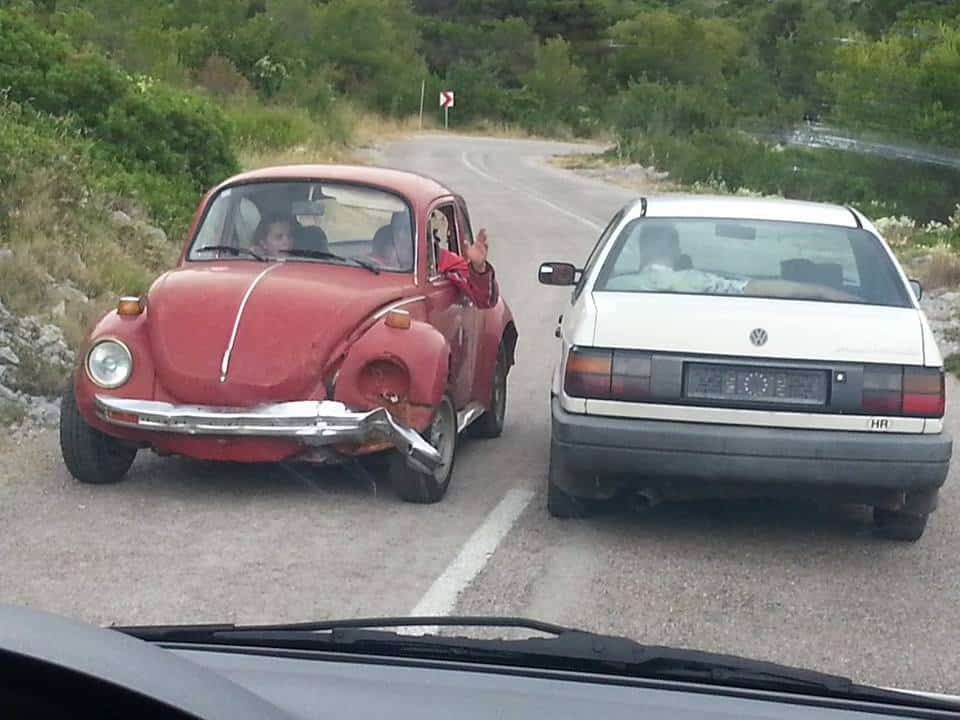
Driving in Croatia - is it safe?
From the British Embassy website:
In 2019 there were 297 road deaths in the Croatia (source: Department for Transport). This equates to 7.3 road deaths per 100,000 of population and compares to the UK average of 2.6 road deaths per 100,000 of population in 2019.
Having survived Ethiopia, where the Italians taught the locals to drive in Russian Ladas, anywhere feels safe to me. Some of the local driving leaves a little to be desired, and there tends to be a relaxed approach to driving with alcohol, particularly in more rural places, although the police have recently introduced draconian fines for those caught.
Road safety
Take care when overtaking and be wary of other road users unexpectedly overtaking in slower traffic. Minor roads are usually unlit at night.
Emergency road help (HAK) may be reached by dialling (385 1) 1987. This service is staffed by English speaking operators. Traffic information in English is available on 98.5FM during the tourist season only.
Driving regulations
It is illegal to drive with more than 0.05% of alcohol in the blood system.
You must drive with dipped headlights from the last weekend in October until last weekend in March, even during the daytime. You must have winter tyres on your vehicle between 15 November and 15 April. You must not use a mobile phone whilst driving.
It’s obligatory to carry a fluorescent vest in your car whilst driving in Croatia. You must keep the vest in the car and not in the boot. You should wear the vest while attending to a breakdown. All passengers must wear seat belts and special seats are required for infants. Children under the age of 12 must not sit in the front seat.
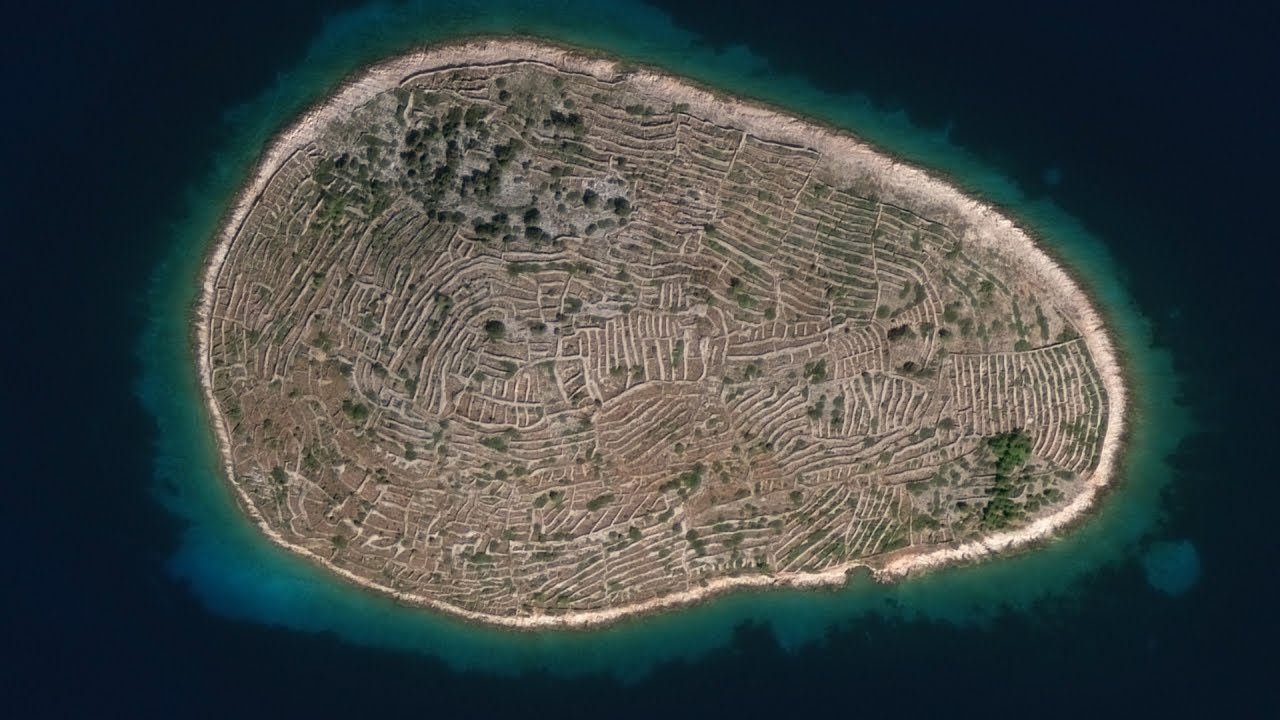
Conclusion: Is it dangerous to visit Croatia?
Did you know that the man who discovered fingerprinting was a policeman in Argentina who was born on Hvar? Or that Croatia has an island called Baljenac, which is strikingly similar to a fingerprint? With these facts, how could Croatia be anything but safe?
Croatia is as safe as any country in Europe, and that safety is one of its largely untapped marketing gems, along with its lifestyle and amazing authentic experiences. Have you booked your holiday to Croatia, Your Safe, Authentic Lifestyle Destination yet?
If you have any suggestions to add to this resource, please send to This email address is being protected from spambots. You need JavaScript enabled to view it. Subject Safe.
To follow the People Also Ask Google about Croatia series, click here.
Petrinja and Sisak Shifted up to 86 Centimetres Due to Earthquake
ZAGREB, 14 February, 2021 - The findings of global navigation satellite system (GNSS) measurements conducted by Croatia's State Geodetic Administration from 4 to 28 January 2021, show that the cities of Petrinja and Sisak, hit by the 29 December 6.2 quake, were shifted up to 86 centimetres.
The Civil Protection Directorate reported on Sunday that the relevant analyses show that Petrinja was shifted southeast and Sisak eastward.
Glina, the third city most affected by the 29 December earthquake and aftershocks, was shifted by 10 centimetres northwest. Also, the area in which the city of Glina is located, sank 10 centimetre.
These first official data will be used for the activities pertaining to the reconstruction of geodetic baselines and for the homogenisation of surveys.
The devastating quake killed seven victims and caused extensive damage. Preliminary mapping prepared on the basis on satellite images provided by the European Space Agency showed in early January that the disaster caused shifts of soil with the amplitude of up to 70 centimetres. The biggest shift was then registered in the forest area near the settlements of Slana, Glinska Poljana and Gora.
For more information about the latest from the earthquake aftermath, follow the dedicated TCN section.
Jutarnji List: More Vaccines Arriving, Mass Inoculation Centres to be Set Up
ZAGREB, 14 February, 2021 -The Jutarnji List daily newspaper reported on Sunday that 71,325 doses of COVID vaccines would be delivered to Croatia next week.
According to the head of the Croatian Institute of Public Health (HZJZ), Krunoslav Capak, 18,525 doses of the vaccine developed by Pfizer-BionTech can be expected in the country on Monday, while on Tuesday, a shipment of 16,800 Moderna vaccine and another 36,000 doses of AstraZeneca vaccine are due to arrive.
The daily newspaper highlights the fact that more than 70,000 Croats can be inoculated against coronavirus in a week, which is more than the number of inoculated citizens in the whole of January.
The acceleration of the implementation of the vaccination rollout plan means that some kind of mass inoculation centres should be set up in cities.
The daily says that this is good news after some delays in the delivery of vaccines throughout the European Union.
For the latest news about coronavirus in Croatia, follow the dedicated TCN section.
Volunteer at Mljet National Park for 7 Days Beautiful Island Exploration
February 14, 2021 – Want to spend 7 days making your way across one of Croatia's most unique island landscapes? Volunteer at Mljet National Park and get a week's free accommodation, with English speaking and Croatian speaking volunteers both welcome
Recently ranked by global player Forbes as among the top five Mediterranean undiscovered islands, Mljet can be yours to explore for free if you have some free time on your hands. Mljet National Park is looking for volunteers to help clear and maintain hiking trails on the island. If you volunteer at Mljet, you'll get seven nights of complimentary accommodation, plenty of free time and the opportunity to make your way across one of Croatia's most beautiful and unique island landscapes.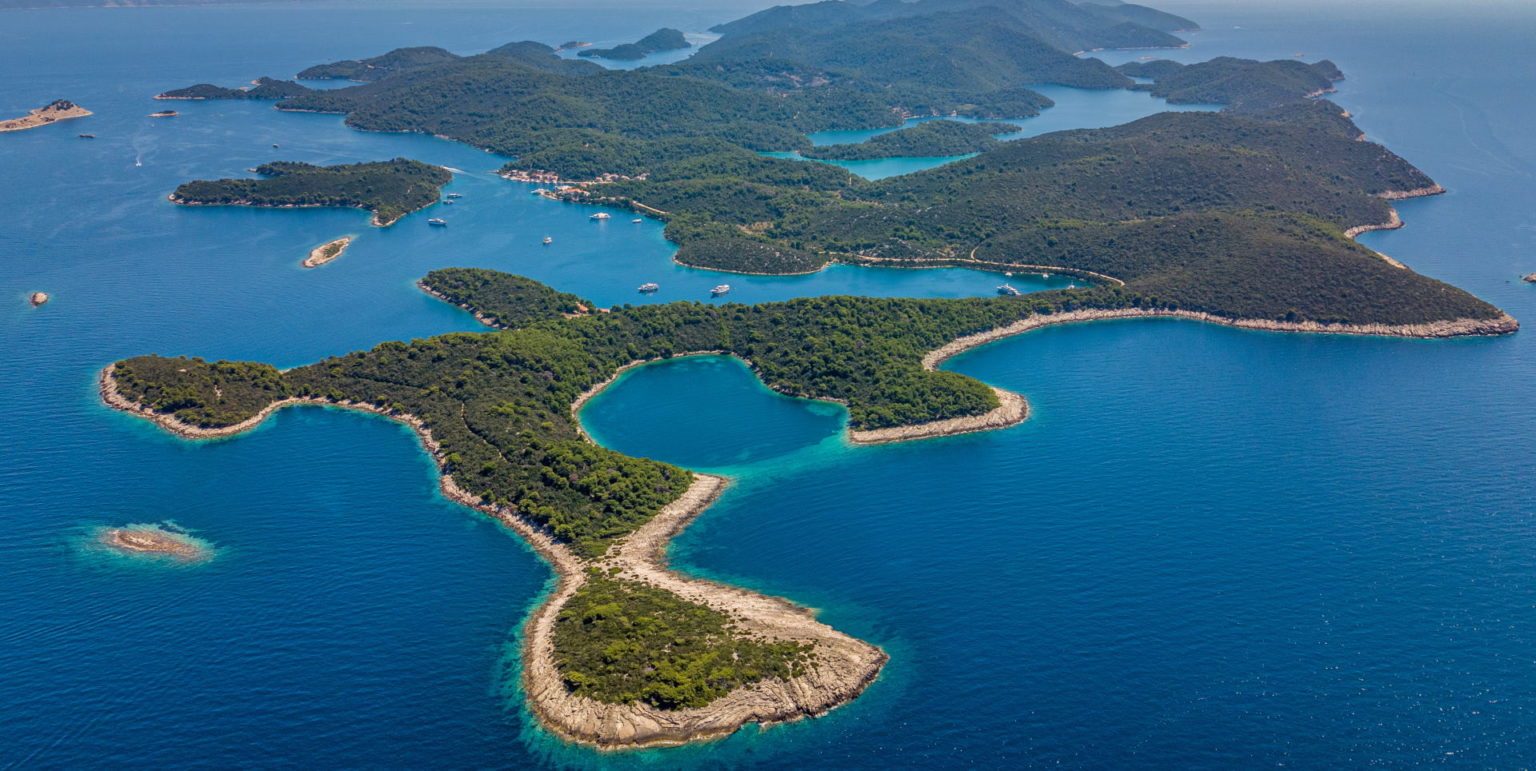 © Mljet National Park
© Mljet National Park
Those who volunteer at Mljet National Park will get to explore the entire north-west part of Mljet island, a protected area of stunning natural beauty that borders two famous saltwater lakes –Veliko Jezero and Malo Jezero which stretch 4 kilometres into the island's interior. In the middle of the largest lake, there is a small island, Melita (Sveta Marija) on which a 12th-century Benedictine monastery picturesquely sits.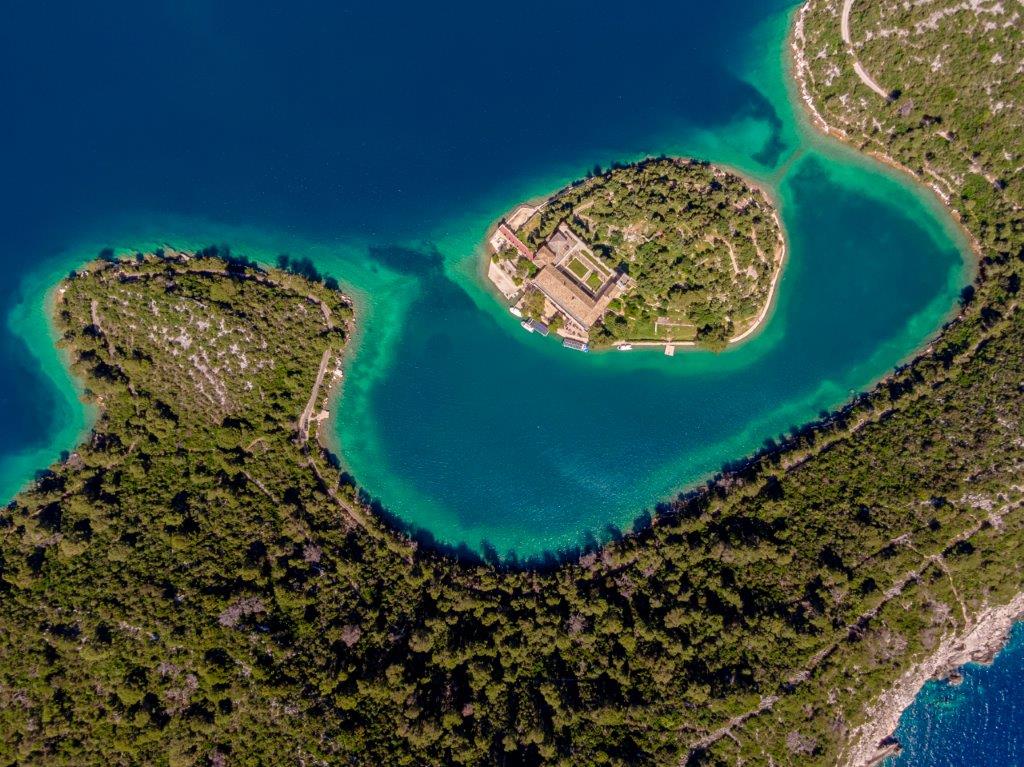 The island of Sveta Marija © Mljet National Park
The island of Sveta Marija © Mljet National Park
The oldest marine protected area anywhere on the Mediterranean, as Mljet National Park stretches over almost 5300 hectares, there's no guarantee these spectacular lakes will be within your view as you volunteer at Mljet. But, you will have plenty of time to explore the park and the island's incredible sights – volunteering hours are restricted to just six hours per day.
Over 40 kilometres of hiking trails run along the shoreline and through the forests of the park. Those who volunteer at Mljet will be asked to clear trails that have become obstructed by winter's strong winds blowing down trees and branches. Any equipment needed for the tasks, like compulsory work gloves, hats and t-shirts, will be provided by park authorities to all who volunteer at Mljet.
The groups required to volunteer at Mljet will be comprised of no less than 6 people and no more than 12 people at a time. You can apply to volunteer at Mljet alone - and maybe make some new buddies - or you can apply to go with a friend or friends. Both English speakers and Croatian speakers are invited to apply. Free accommodation is supplied in the Cullier building, owned by the Park. There are 7 rooms with bunk beds, toilets, showers, kitchen, living room. The building is just 2 km away from the village of Pomene, which has the only hotel on the island, several restaurants and two shops that are open during the summer. All meals are also provided free to those who volunteer at Mljet.
When can I volunteer at Mljet National Park?
Volunteer positions are available between February and November with the following being the specific weeks:
27/02 - 06/03
06/03 - 13/03
21/03 - 27/03
27/03 - 03/04
10/04 - 17/04
17/04 - 24/04
15/05 - 22/05
11/09 - 18/09
25/09 - 02/10
02/10 - 09/10
09/10 - 16/10
Volunteering lasts 7 days, one day of which is a free day - you can explore the park or take part in a tour of the island which the park organises as thanks to all volunteers. Volunteers will work 6 hours a day for the 6-day duration, although this 6 hour period does include one full hour of rest time. If there are unfavorable weather conditions (strong sun, wind, etc.) working hours may be reduced. Volunteers require only physical readiness and the desire to stay and work within a natural, outdoor environment. As the volunteering work requires physical strength and dexterity, these particular positions at the park are sadly not open to those with disabilities. Local transport within the Park is provided. Travel expenses for arrival and departure from the Park are borne by the volunteers themselves.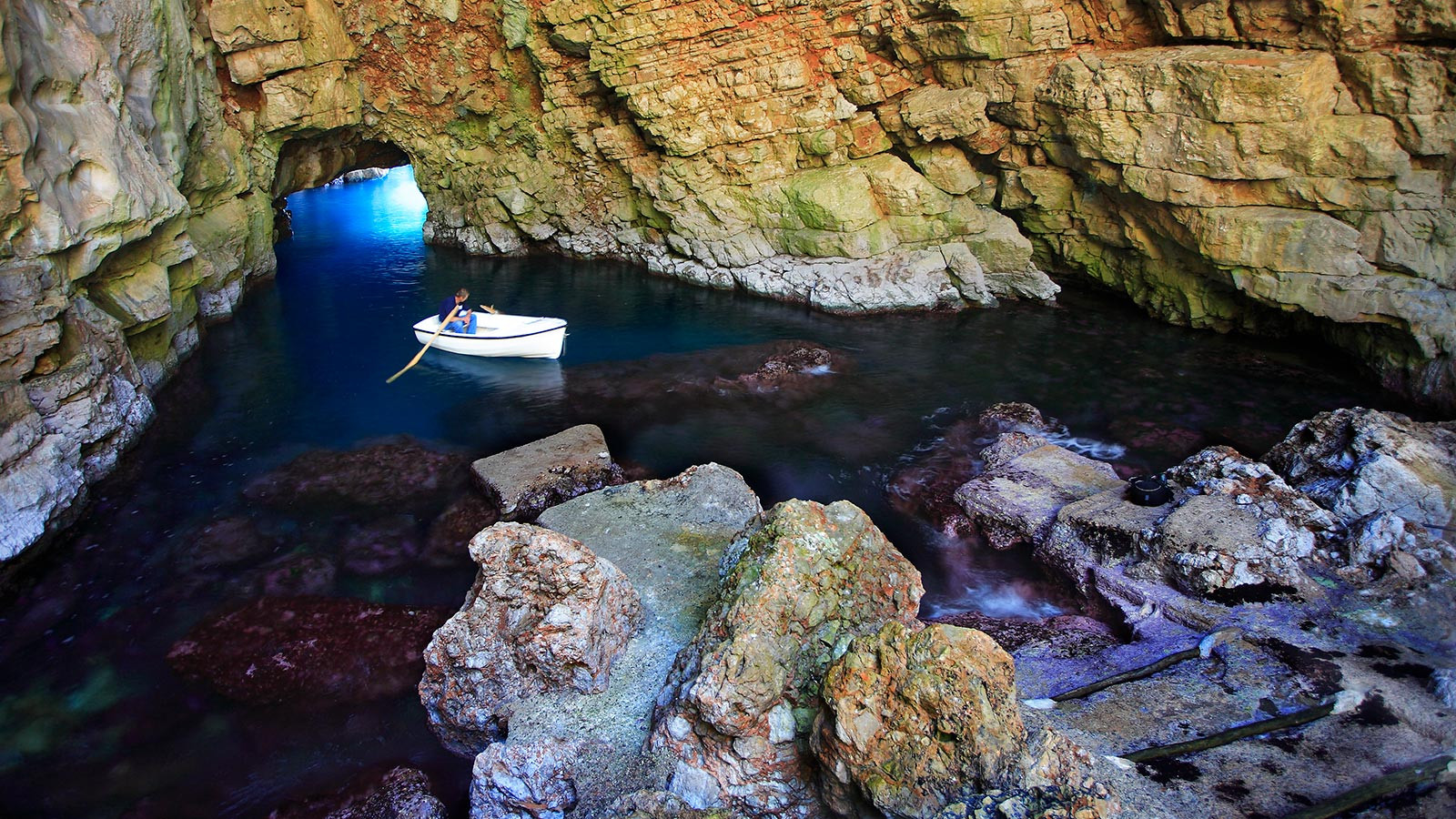 The Ulysses cave on Mljet island © TZ Mljet
The Ulysses cave on Mljet island © TZ Mljet
During the free time you'll have on the island, you can walk, hike or bicycle on the park's trails, rent kayaks and canoes to explore the stunning saltwater lakes, go diving or take diving lessons, rent a scooter or car to explore the whole island and its many sights, or just chill out with your fellow volunteers, park staff and the park's visitors at the accommodation centre or in a local tavern.
Want to extend your stay in Croatia by a week with free accommodation on an incredible island? Got some free time on your hands and an appreciation of the great outdoors? If this opportunity sounds like it might be for you, you can fill in a form and apply here


